
Facebook might have started as a way to connect college students, but today it is a full-fledged search engine, much like Google or Bing. The social media giant’s rise to search engine status includes the addition of advanced features, like Facebook search operators.
What are Facebook search operators, and why should you care about them?
Search operators are a powerful tool for filtering search results, but they also have added benefits for marketers and business owners.
Before we get into that, let’s first talk about what search operators are and why they matter.
What Are Search Operators?
Search operators are advanced search commands that make it easier to filter search results based on what you do (or don’t) want to see in search results.
For example, if you were looking up recipes for chicken soup but didn’t want to see results from Pinterest, you could use a search operator to remove Pinterest results by typing in:
“Chicken soup -pinterest”
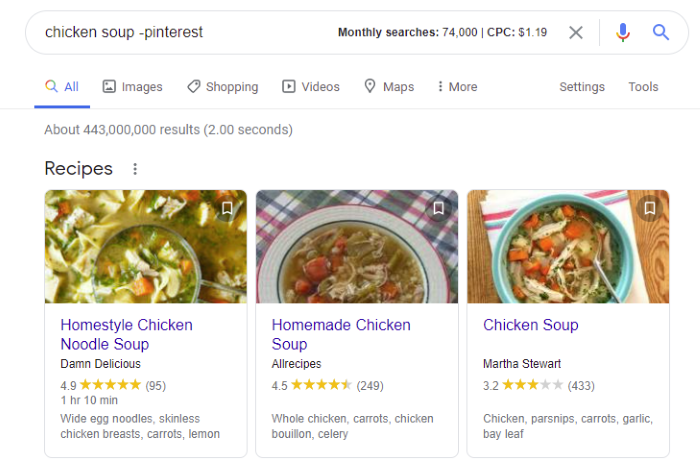
Google uses a wide range of these search functions that make it easier to use the search engine, including:
- @: to search social media sites
- $: to search for a price
- –: to leave a word out
- “Quotes”: to search for an exact match
- . . .: to search a range of numbers
- OR: to combine searches
- Site: to search a specific site
- Related: to search for similar websites
You can also combine these commands if you want to get fancy. For example, you could use “@ neil patel OR kelsey jones” to search for social accounts for both Neil Patel and Kelsey Jones.
Search operators make it easier to find the exact data you are looking for, but they also come in handy for marketers.
4 Reasons to Use Facebook Search Operators
Facebook used to have a feature called the Facebook Graph Search, which allowed users to search for specific content on the platform by using sentences rather than just keywords. It also allowed you to find who liked a page or visited a specific city.
Facebook Graph was changed in 2019, making it much harder to search the platform. Search operators, however, fill that gap by allowing users to search for highly specific content.
How can Facebook search operators help marketers? Here are a few ways you can use those advanced search features:
- Research your competitors: See what your competition is up to, including what type of content they share and what topics they talk about. You can also find new competitors in your geographical area.
- Find content to share: Search for multiple topics or exact phrase matches to find content your audience will connect with.
- Find user-generated content (UGC): Search for your brand name (and common misspellings of your brand name) to find content users have shared about your brand, even if they didn’t tag you.
- Research your audience: Understanding who your audience is and what type of content they like can help you build a stronger relationship. Use Facebook search operators to find content on related topics or specific phrases.
7 Facebook Search Operators to Try (and How to Use Them)
Facebook search operators use Boolean operators, which are the basis of database logic. In layperson’s terms, Boolean operators are terms that allow you to broaden or tighten the search results. For example, you could use AND to search for two search terms at the same time.
Below, I’ll cover how to perform each type of Facebook search, explain what information it will help you find, and explore how to use the search operators to grow your business.
I know it might sound complicated, but I promise it’s pretty simple, and the results are worth the effort.
1. Basic Boolean Facebook Search
Boolean searches don’t work using Facebook search, so you’ll need to use Google to perform all the searches we’re about to cover.
Using site: before the name of a site will display search results just for that specific website. Here’s how it works in practice. Type in site:facebook and then whatever search term you’re searching.
Example:
site:facebook.com my favorite murder podcast
This will display the results of groups or posts about the My Favorite Murder podcast.
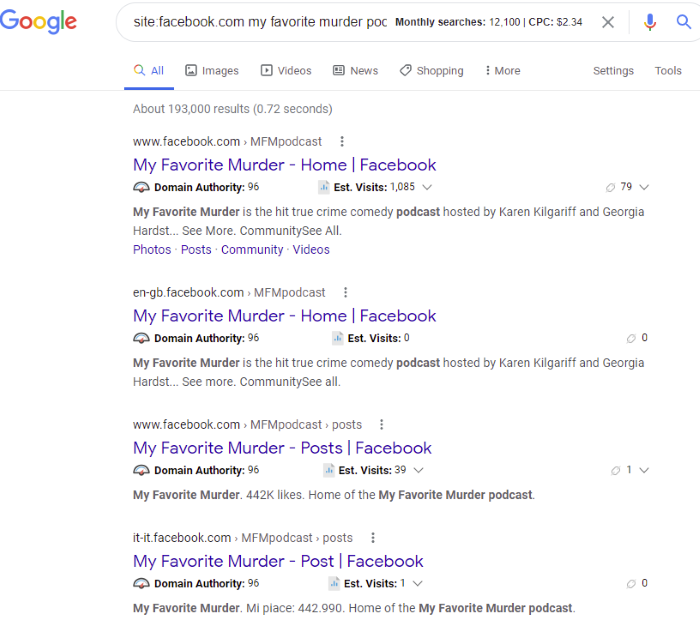
How to Use This Facebook Search Operator to Grow Your Business
Use this to find groups, pages, and users related to a specific topic. For example, if your target audience is small business owners, you could search for groups and pages for small business owners.
Pro tip: This search works for all websites, not just Facebook. Say you want to find a post from your favorite digital marketing blog or by a specific writer. Then you would perform a search for “site: <website URL> <the term you’re looking for>.”
2. Boolean Facebook Search for Two Terms Needing to Be Present
Using the AND Boolean search function, you can search for two terms simultaneously. For example, if you want to find information about digital marketing and small businesses, you would search:
site:facebook.com digital marketing AND small business
This will display search results related to both digital marketing and small businesses:
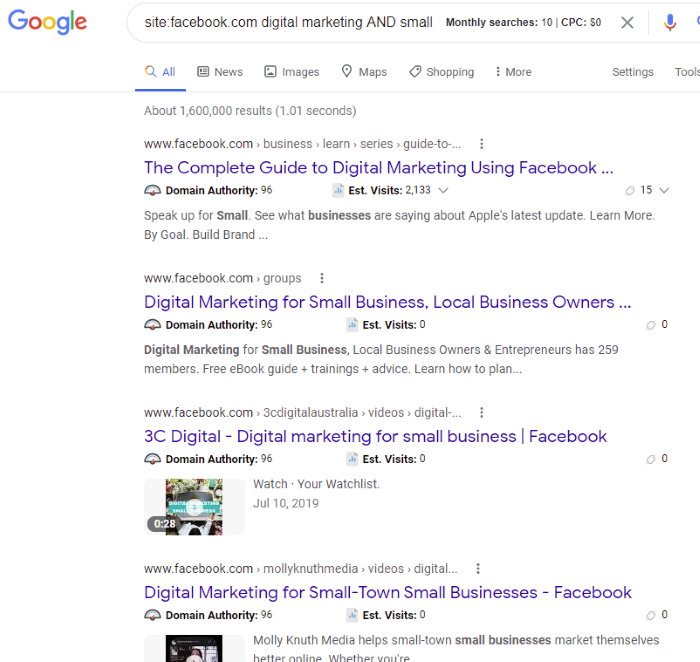
How to Use This Facebook Search Operator to Grow Your Business
Perform competitive research for a specific niche or find groups your target audience belongs to on Facebook.
3. Boolean Facebook Search for One of Two Terms Needing to Be Present
Similar to the AND function, this search operator allows you to find results for one term or another. Unlike AND, which requires both terms to be present, the OR function allows you to find results including either term.
Let’s say you have a software company that targets customers who have SaaS (software as a service) or those who have a membership site. You would search:
site:facebook.com SaaS OR membership sites
The results will display groups, pages, and posts related to SaaS or membership sites.
How to Use This Facebook Search Operator to Grow Your Business
Research several competitors simultaneously or search for content related to your brand using both your official brand name and a misspelling or commonly used term.
For example, site:facebook.com Moz OR Hubspot would return terms related to both brand names.
4. Boolean Facebook Search for Terms That Should Not Be Present
What if you want to search for a specific term, but you keep getting unrelated results? The NOT Boolean function allows you to remove unrelated search terms.
For example, let’s say you are looking to hire a web developer, but you keep seeing results for designers. You would search:
site:facebook.com web developer NOT designer
The results will include videos, pages, and profiles related to web developers but not web designers.
How to Use This Facebook Search Operator to Grow Your Business
Search for employees or more specific content related to your industry by excluding specific terms. You can also use it to narrow geographical areas with the same or similar names, such as Paris, Georgia NOT France.
5. Boolean Facebook Search for Exact Phrase
Google and Facebook’s search features have gotten smarter in recent years, but sometimes they still don’t get it quite right. If you find your search results are slightly off, you can use the exact phrase match search operator.
This Boolean function tells search engines to only return matches that are precisely the same as your search.
To use this function, add quotation marks to the term you want to search.
Example:
site:facebook.com “mexican restaurant in kansas city”
A list of Mexican restaurants’ Facebook pages will appear in the SERPs, like this:
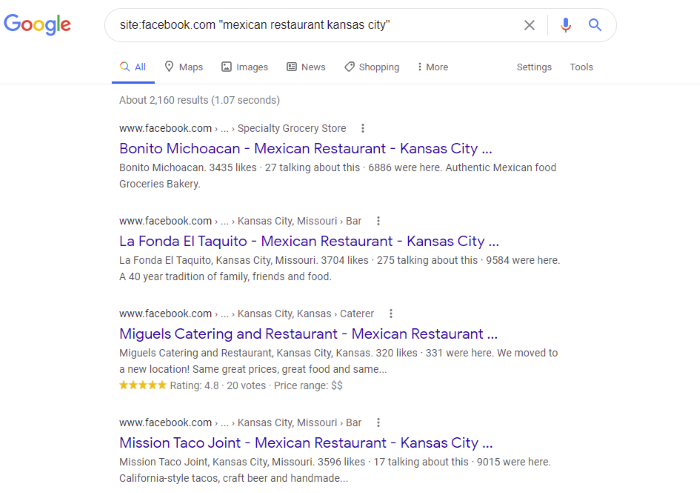
Remember this is an exact match search. The search engine won’t return results that deviate even slightly. Search results for “mexican restaurant in kansas city” versus “mexican restaurants in kansas city” could be extremely different.
How to Use This Facebook Search Operator to Grow Your Business
Find competitors in your area or look for groups or videos related to a specific key term. It might also help you find UGC if your brand name is very similar to another brand or phrase.
6. Boolean Facebook Search to Fill in Blanks
What if you don’t know exactly what you are looking for? The fill-in-the-blank function might come in handy. For example, if you’re looking for a specific person but can’t quite remember their name, you can use an * (asterisk) to tell Google to fill in the blank.
Say you work for Hardrock Cafe and are looking for UGC. Some users might type in Hard Rock Cafe, while others might use Hardrock Cafe. The fill-in-the-blank search operator will return results for both.
Here’s how to use it:
site:facebook.com hard * cafe
Note that this will turn up more than just Hard Rock and HardRock; it returns any results that include Hard and Cafe, no matter what is between them.
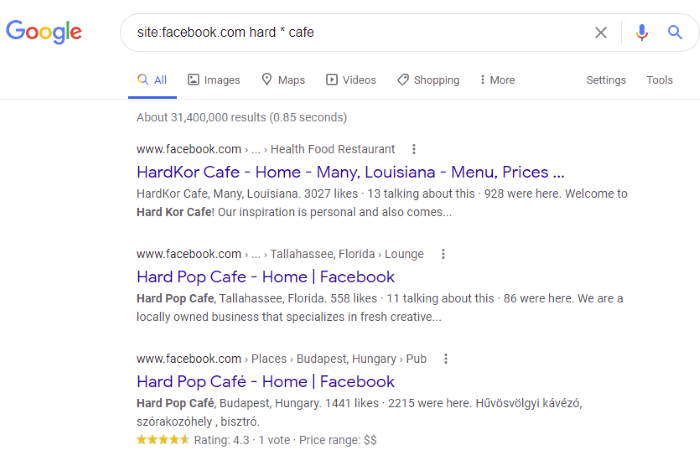
How to Use This Facebook Search Operator to Grow Your Business
Use the fill-in-the-blank function to find information about terms that are often misspelled or formatted differently, or if you can’t remember the exact spelling. This search operator is ideal when users might not remember the exact format of your brand name. It can also help with competitive research by broadening searches.
7. Boolean Facebook Search for Local Businesses
Facebook is a powerful tool for local SEO, with more than 1.85 billion daily active users in the United States alone. Using a search operator for local searches can help marketers and business owners find local businesses.
Say you are considering opening a coffee shop in the Rogers Park neighborhood of Chicago. You could use this search:
site:facebook.com coffee shop rogers park chicago
This returns a list of all the coffee shops in that neighborhood.
How to Use This Facebook Search Operator to Grow Your Business
Local businesses can perform competitive analysis or market research to find local businesses in their niche. It might also help you to find brands for a cross-promotion strategy.
Conclusion
Search algorithms have come a long way in recent years. However, they aren’t perfect.
Facebook search operators let you filter and refine search results for competitive analysis, find content to share with your users, and even locate groups where your target audience hangs out.
If you want to improve your Facebook marketing strategy, search operators are another tool in your toolbelt.
Have you used Facebook search operators before? Which one is most useful?
The post 7 Advanced Facebook Search Operators appeared first on Neil Patel.
from Blog – Neil Patel https://ift.tt/3uOfJWI

No comments:
Post a Comment